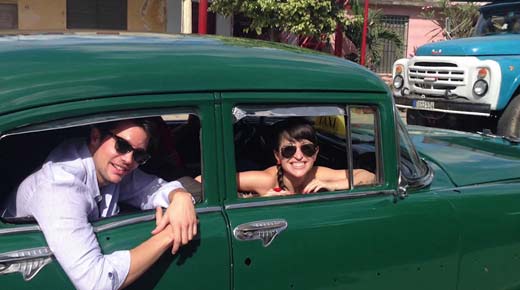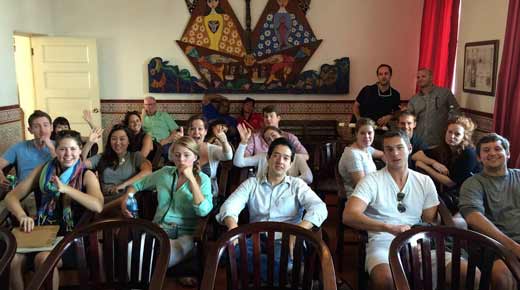
Virginia students discover Cuba
A group of thirty students from the University of Virginia were among the first Americans to visit Cuba after President Obama announced plans to normalize relations with the island nation. The group from UVA’s Darden School of Business made some surprising discoveries.
Professor Greg Fairchild has been to plenty of Third World countries, and arriving at their airports can produce culture shock.
“Something I was accustomed to and prepared for is we would land, and they would know we were Americans, and we’d be swarmed with an effort to get money or deliver us or something. Well in fact, 30 of us roll in with our bags. Not a single person stops us, accosts us: ‘Can I help you, can I sell you?’ None of that.
But on leaving the airport, student Amiel Harper was surprised by the signs.
“You see a lot of these older posters supporting the revolution. It’s not just about Fidel. It’s much more about the communist system and the value of the revolution to the people. There’s one billboard that said the blockade was the longest running human tragedy in the world.”
Despite the anti-American rhetoric, he adds, people were very friendly.
 “We ate in these places called Paladares, which is actually people’s homes. You go into someone’s house. They cook you dinner, and you pay them for it. I felt very warmly welcomed by the people there, particularly being African-American.”
“We ate in these places called Paladares, which is actually people’s homes. You go into someone’s house. They cook you dinner, and you pay them for it. I felt very warmly welcomed by the people there, particularly being African-American.”
And for one member of the group, the welcome was especially warm. John Michael Fryback went in search of family.
“We took a 1957 Chevy out about three hours from Havanna to this small town called Palmera, and we were able to locate my second cousin, twice removed, who’s still living in the house that my great, great, great grandfather built in 1894.”
His cousin was a respected educator at a university nearby – a man who had written textbooks, but he earned just $24 a week.
“He’s literally printed books for the country – a stronomy, physics, these are highly technical subjects. They’re in wide circulation, but the third floor of the house falls down, and he has to sell off family heirlooms to be able to pay for that. At the end of the day he doesn’t have anything. He made that very clear. He wasn’t sad, but at the same time he wants to leave. He wanted a better life for his son. Where does he want to go? He wants to go to the U.S. Did you hear that a lot? Yeah. Everyone we met on the street, when they found out we were American, would say, ‘Oh we’re coming to visit you,’ and named a whole bunch of cities they want to visit. “
That’s Laura Redden, another student who made the trip. She was impressed by the entrepreneurial spirit she saw in Cuba. Everyone seemed to be hustling to make ends meet and to get what they needed. After buying art at a local shop, the owner admired her handbag.
“When I was on my way out of the store, and she was like, ‘Or I could take your purse, and then I’ll give you your money back for the painting you had just purchased,’ and I said, ‘Okay.’”
There is no internet in Cuba, but people were well aware of American culture. Harper discovered that on one of the group’s evenings on the town.
“Our tour guide took us to a nightclub, and I walk in, and the song that’s playing is Taylor Swift’s Shake It Off. This idea of Cubans being so disconnected was just shattered.”
But everyone agreed that this island that has been cut off from commerce with American faces many challenges. Professor Fairchild said Cubans didn’t seem to understand advertising, and they’re probably not ready for the flood of U.S. tourists that could be coming their way.
(From: WVTF)

